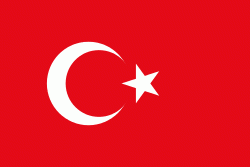Başmakçı
Başmakçı is a town of Afyonkarahisar Province in the Aegean region of Turkey, closer to Denizli than to the city of Afyon itself. It is the seat of Başmakçı District. Its population is 4,993 (2021). The mayor is Halil Özcan (CHP).
The history of Başmakçı goes back to the Hittite era, 1750-1200 BC. It then became a colony of the Phrygians of nearby Dinar. It was subsequently possessed by Lydians, Persians, Ancient Macedonians and Seleucids, the kings of Pergamon, Romans and then Byzantines.
Turkish tribes arrived in Anatolia in 1071, and one of these was the Başmakçı, who came through Azerbaijan, settling near Tarsus on the Mediterranean, where there is a village called Başmakçı still today, and then sometime between 1100 and 1200 moving west to settle in this district of Afyon that has been called Başmakçı ever since.
This part of Anatolia was subsequently controlled by the Germiyan dynasty, who gave the town as dowry when marrying their daughter to the Ottoman Sultan Bayezid I. Thus Başmakçı, a village of 47 families at the time, became an Ottoman land.
Başmakçı was badly damaged in an earthquake in August 1892 when 300 homes were destroyed. However, no one was killed, as it was harvest time and all were in the fields.
Başmakçı was not occupied during the Turkish War of Independence but many of its sons died in that war and World War I previous to it.
The history of Başmakçı goes back to the Hittite era, 1750-1200 BC. It then became a colony of the Phrygians of nearby Dinar. It was subsequently possessed by Lydians, Persians, Ancient Macedonians and Seleucids, the kings of Pergamon, Romans and then Byzantines.
Turkish tribes arrived in Anatolia in 1071, and one of these was the Başmakçı, who came through Azerbaijan, settling near Tarsus on the Mediterranean, where there is a village called Başmakçı still today, and then sometime between 1100 and 1200 moving west to settle in this district of Afyon that has been called Başmakçı ever since.
This part of Anatolia was subsequently controlled by the Germiyan dynasty, who gave the town as dowry when marrying their daughter to the Ottoman Sultan Bayezid I. Thus Başmakçı, a village of 47 families at the time, became an Ottoman land.
Başmakçı was badly damaged in an earthquake in August 1892 when 300 homes were destroyed. However, no one was killed, as it was harvest time and all were in the fields.
Başmakçı was not occupied during the Turkish War of Independence but many of its sons died in that war and World War I previous to it.
Map - Başmakçı
Map
Country - Turkey
 |
|
| Flag of Turkey | |
One of the world's earliest permanently settled regions, present-day Turkey was home to important Neolithic sites like Göbekli Tepe, and was inhabited by ancient civilisations including the Hattians, Hittites, Anatolian peoples, Mycenaean Greeks, Persians and others. Following the conquests of Alexander the Great which started the Hellenistic period, most of the ancient regions in modern Turkey were culturally Hellenised, which continued during the Byzantine era. The Seljuk Turks began migrating in the 11th century, and the Sultanate of Rum ruled Anatolia until the Mongol invasion in 1243, when it disintegrated into small Turkish principalities. Beginning in the late 13th century, the Ottomans united the principalities and conquered the Balkans, and the Turkification of Anatolia increased during the Ottoman period. After Mehmed II conquered Constantinople (Istanbul) in 1453, Ottoman expansion continued under Selim I. During the reign of Suleiman the Magnificent, the Ottoman Empire became a global power. From the late 18th century onwards, the empire's power declined with a gradual loss of territories. Mahmud II started a period of modernisation in the early 19th century. The Young Turk Revolution of 1908 restricted the authority of the Sultan and restored the Ottoman Parliament after a 30-year suspension, ushering the empire into a multi-party period. The 1913 coup d'état put the country under the control of the Three Pashas, who facilitated the Empire's entry into World War I as part of the Central Powers in 1914. During the war, the Ottoman government committed genocides against its Armenian, Greek and Assyrian subjects. After its defeat in the war, the Ottoman Empire was partitioned.
Currency / Language
| ISO | Currency | Symbol | Significant figures |
|---|---|---|---|
| TRY | Turkish lira | ₺ | 2 |
| ISO | Language |
|---|---|
| AV | Avar language |
| AZ | Azerbaijani language |
| KU | Kurdish language |
| TR | Turkish language |















